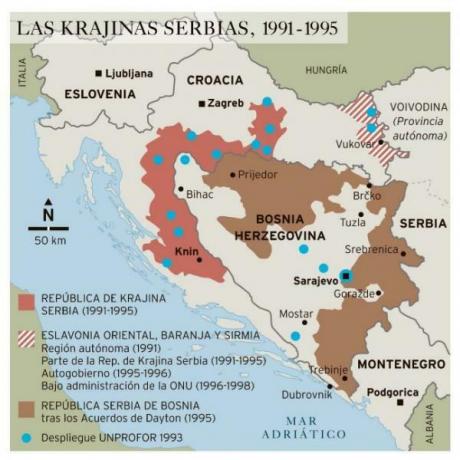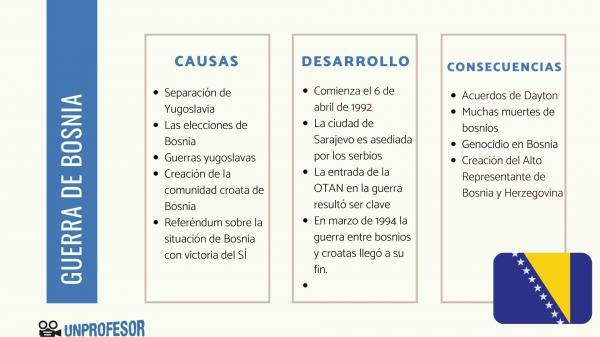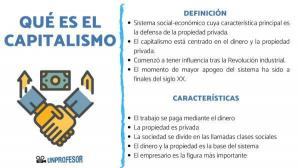BOSNIA WAR summary: causes and consequences

The Bosnian War It was a warlike conflict that took place in the European nation between the April 6, 1992 and December 14, 1995, at a time when many factors led to a large-scale military movement due to the situation after the disappearance of Yugoslavia. To know in depth all the aspects of this period in this lesson from a PROFESSOR we must talk about the Bosnian war: summary, causes and consequences.
All wars in the history of mankind have been started by a series of causes with greater or lesser relevance, being at least It is so necessary to talk about the antecedents of a conflict to understand what leads one or more populations to start a conflict. war. Therefore, in this section we must list some of the main causes of the Bosnian war.
Separation from Yugoslavia
The first of the factors that influenced the war was the separation of the nation known as Yugoslavia, since in 1991 the independence of Slovenia and Croatia had led to the end of the European nation as it was known. The end of Yugoslavia was a problem for Bosnia and Herzegovina, being a region with a multitude of ethnic groups that made a quiet independence very difficult.
Bosnian elections
In the late 1990s, elections were held in Bosnia at a time when it was still a region within Yugoslavia. The votes carried out had an important ethnic influence, so that the Bosnian, Serbian and Croatian parties received the greatest support. In this situation the president of the nation was Bosnian, the Speaker of Parliament was Serbian and Prime Minister was Croatian, causing an even greater ethnic clash.
Yugoslav wars
During 1991, numerous meetings took place between the leaders of the Yugoslav regions to manage the situation of all of them after the end of Yugoslavia, on the Bosnian side their leader asked for the existence of a Bosnia sovereign. In this situation of so much tension, the war for the independence of Slovenia and Croatia began, which were the first yugoslav wars.
Creation of the Bosnian Croat community
With the war for the independence of Croatia already started, the Croats sought Bosnian support for the war, being the reason why They were willing to consider Bosnia their own region if they helped them, but as long as they gave priority to the population Croatian. On November 18, 1991, the Croatian community of Bosnia and Herzegovina was formed.
Referendum on the situation in Bosnia
Following the example of Croatia and Slovenia, the Bosnian region called a referendum to ask its population about the possibility of becoming independent and forming a sovereign region. The victory of the SI in the referendum and the tension caused by the Serbian forces increased the tension between the ethnic groups in the region.
We already started with the summary of the Bosnian war to really know what happened. The growing tension that we have commented on the causes, led to andl start of the Bosnian war, which faced Bosnians, Serbs and Croats, or what is the same, Muslims, Orthodox and Catholics. For all this we can say that the war was at the same time an ethnic, ideological and religious confrontation.
On April 6, 1992, and after the European Union had recognized the independence of Bosnia, the action that starts the war takes place, when in the Bosnian capital, Sarajevo, a group of protesters are shot dead by a group of Serbs, starting the war.
During the following months, the city of Sarajevo is besieged by Serbs, causing that in June of 1992 the UN creates an airlift to give humanitarian aid to the Bosnians and shortly after the Serbs give the airport of the city to the UN.
At the beginning of 1993 they began to talk about the first peace plans to end the war, but none of the three opposing groups seem to be clear that it is the moment of peace. Therefore throughout the year the war was maintained with hard confrontations between the three factions and NATO entry in the conflict, which she had almost 50 years without acting in a war.
The entry of NATO and the end of the Bosnian war
NATO's entry into the war turned out to be key and led to in March 1994 the war between Bosnians and Croats will come to an end. The peace treaty between the two regions was signed in the United States and brought a new organization to the region.
The continued attacks by the Serbs on peaceful areas meant that the UN and NATO will continue to support Bosnia and, therefore, in 1995 the Serbian victory was increasingly complicated. After a year with some of the biggest war crimes in history in November 1995 and after a peace conference in the United States, the war could come to an end.

Image: The World
To conclude this lesson on the Bosnian war, we must talk about everything that happened after the end of hostilities, listing its consequences and its great importance.
Dayton Accords
The Dayton Accords were a series of documents signed by the Bosnian war factions that served to end hostilities. Among the measures taken in the accords are the division of the regions and the promise of fulfilling peace.
Bosnian deaths
Another consequence of the Bosnian war is that it brought death to more than 100,000 people, the vast majority of them being of Bosnian origin, causing a huge demographic shock and one of the largest numbers of casualties in the history of the area.
Genocide in Bosnia
During the years that the war lasted, the Serbian side carried out a so-called ethnic cleansing on Bosnians, killing more than 8,000 people. The worst moment of this genocide was the Srebrenica massacre in which thousands of people were shot.
Creation of the High Representative of Bosnia and Herzegovina
In order for the signed agreements to be fulfilled and for there to be no more confrontations between the different regions, the High Representative of Bosnia and Herzegovina, being a key element to keep the peace.

If you want to read more articles similar to Bosnian war: summary, causes and consequences, we recommend that you enter our category of Story.



